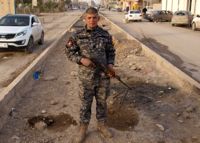‘Sons of Iraq’ Orphaned

'We have not been paid since the Americans left Iraq last December. If nothing changes, I will abandon this checkpoint,' Saif Ahmed tells IPS. He is one of the militiamen who claim to have defeated Al Qaeda in Iraq.
In Samarra, a Sunni town 150 kilometres north of Baghdad, dismay among the Sahwa fighters is as tangible as the rubble and the dust.
'It was us, and not the Americans, who defeated Al Qaeda in Iraq,' says Sheik Khalid Fleieh, one of the advocates of the ‘Awakening Councils’ - Sahwa in Arabic - recalls at his heavily guarded house in downtown Samarra.
The Sahwa militia, also known as the 'Sons of Iraq', were a paramilitary group set up by a coalition of different tribal leaders to ensure safety in their communities. The movement was founded in the mainly Sunni regions of Anbar and Salahadin in central Iraq in 2005. In less than a year, the 'Sons of Iraq' were already a parallel security force alongside the existing ones, operating across the country.
'Al Qaeda came to our country immediately after the invasion with the pretext of fighting the occupiers. At first we fought together but soon the Jihadists began to kill our own people: tribal leaders, lawyers, teachers, engineers...everyone who played a visible role in our society became a target automatically,' says Fleieh.
In fact, many of today’s Sahwa fighters are former insurgents who turned into pro-government militias at some point. After its inception in 2005 they received salaries of around 250 dollars monthly for manning checkpoints and patrolling their own areas. But those low revenues have vanished today with the withdrawal of the Americans.
'The original plan was to gradually integrate our men into the Iraqi security forces but now we’re all starting to realise that those were just fake promises,' Abdullatif Majid Latif, commander of the militia in Samarra, explains at the militia headquarters in the city.
'I have 2,000 men who have families to take care of in a desperate situation. All of them still remain loyal to Sheikh Khalid Fleieh but I wonder how long will this last,' adds the military official.
Abdullatif's men belong to the approximately 100,000 today lining up in the Sahwa militia. The first stage of an initially ambitious plan was to incorporate a quarter of them into the security forces. Today, things are not working as expected. Everyone wonders what will happen to thousands of broken armed men.
Samarra Sahwa militiaman Abdulljabar Abdulrahim is categorical: 'If I’m not paid in April I'll quit and look for something else, either in the construction or the cleaning sectors,' he says, armed with an AK-47 rifle and dressed in sweatpants and slippers.
'My uniform collapsed after four years of service and I cannot buy a new one because I can hardly get bread for my kids,' says the militiaman as he mechanically manages the heavy traffic in his district in northern Samarra.
Among the local unarmed Samarrans, opinions range from compassion to indifference.
'The poor chaps are now waiting until they’re killed by a terrorist for doing a job nobody is paying. Could anyone be more unfortunate?' says Yousef Abdulhamid at a grocery stall close to Samarra’s iconic ziggurat-shaped minaret. A few hundred metres from there, a poster hangs on a wall in memory of Nasaif Omar Jassim, a Sahwa militiaman allegedly killed by Al Qaeda two months ago.
'I couldn’t care less about their fate,' says Rahim, a local taxi driver. 'They joined the invaders, they were used like tissues and now they’re thrown to the dustbin. What did they expect from the Americans?' Rahim, despite the recent withdrawal of U.S. troops, says he is living under another occupation; 'of Iran through the Shia political parties in power.'
Some others seem more optimistic. From his office in the city hall, Mayor Omar Hassan Mohammed points to a 'significant improvement' in the security situation. The reason, he says, is the perfect balance between the troops deployed in Samarra.
'We have central government forces alongside those from the ministry of interior and, of course the Sahwa militia. Except for some isolated incidents, security is almost fully granted.'
Today no one disputes that the 'Sons of Iraq' have helped to significantly reduce the levels of violence in the country. But many, starting from Prime Minister Nouri al Maliki fear that such groups can become uncontrollable in the future and turn into 'armed Sunni opposition'.
From his home in Baghdad’s Karrada district in the south-east of the capital, Saad al Muttabili, member of Dawa, Nouri al-Maliki’s party, shares his view on the Sahwa issue.
'The ‘Sons of Iraq’ programme succeeded in attracting many armed insurgents towards the new government but it was a programme initially set up and coordinated by the Americans,' he tells IPS.
'It took an awful lot of time for Americans to transfer their database that included 97,000 names. Among those we found a 13-year-old kid and a 70-year-old man… Later, we had to get rid of those with previous criminal records, or simply those who had not gone through any specific military training.'
As the future of the 'Sons of Iraq' remains on standby, a growing number of Sunnis say they are being systematically discriminated against by the Shia coalitions in power. Many fear Al Qaeda could become the only possible source of income for those tens of thousands kept out of the state security forces.
© Inter Press Service (2012) — All Rights ReservedOriginal source: Inter Press Service
 Global Issues
Global Issues